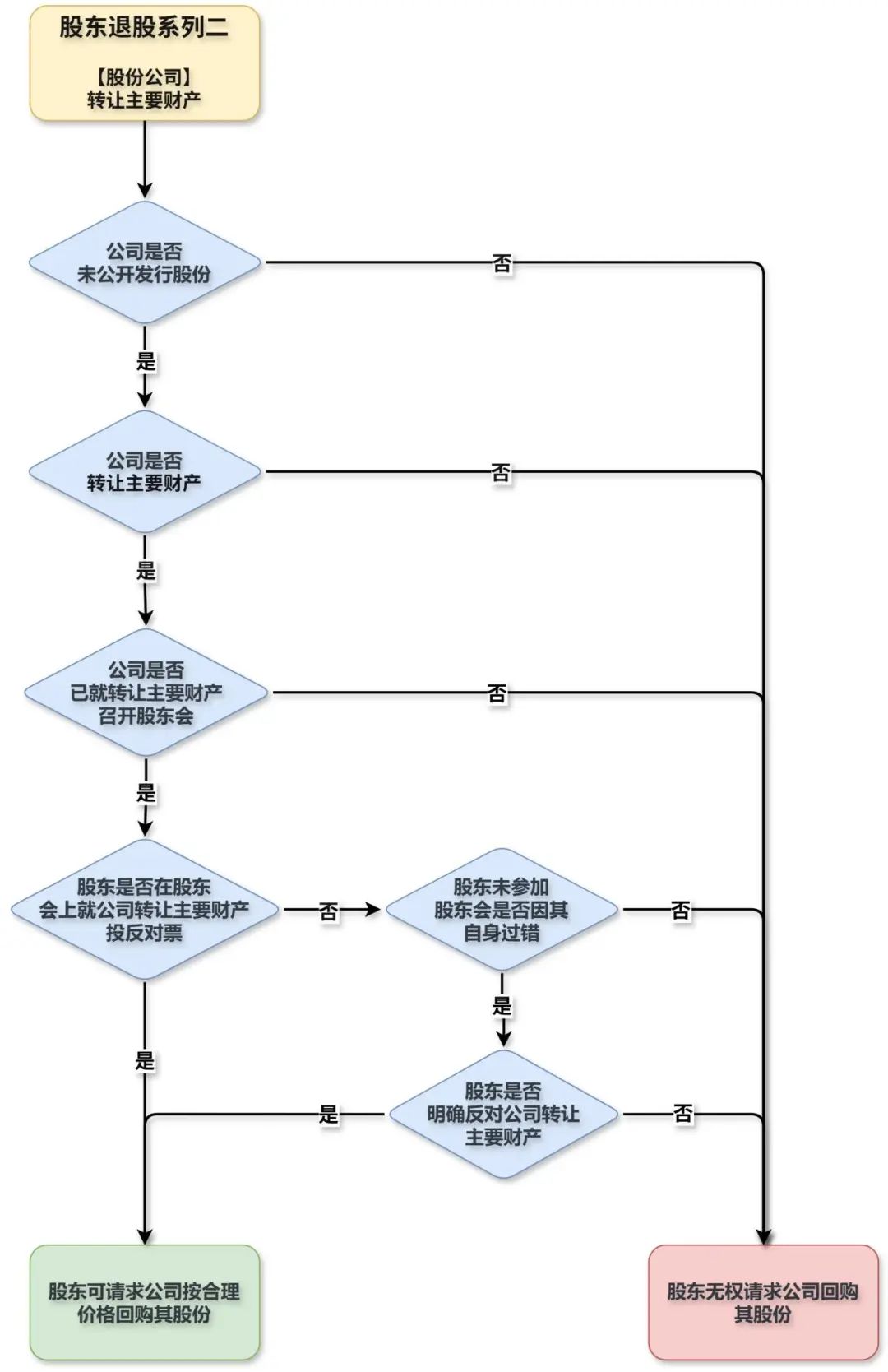How shareholders can withdraw their shares Series 2: Company merger, division, or transfer of major assets
In the previous issue, we talked about the first way for shareholders to withdraw their shares: the company has been profitable for five consecutive years without dividends (click to view). Interested parties can take a look. Today we will talk about the second method: company merger, division, or transfer of major assets.
This method, like the first one, is a legal requirement for companies to repurchase shareholders' equity or shares. As long as the conditions are met, even if there is no agreement, shareholders can have the company withdraw its shares!
1、 How is the law regulated
For limited companies, Article 89 of the new Company Law stipulates that if a company merges, splits, or transfers its main assets and shareholders vote against it at the shareholders' meeting, they have the right to demand that the company repurchase their equity.
For joint-stock companies, Article 161 of the new Company Law stipulates that if a company transfers its main assets and shareholders vote against it at the shareholders' meeting, they have the right to demand that the company repurchase their shares; However, companies that publicly issue shares are excluded.
The core of the above two regulations is to protect the rights and interests of shareholders in major decisions of the company. It should be noted that if a joint-stock company merges or splits, shareholders cannot demand the company to withdraw its shares according to law, which is different from a limited company.
2、 What is a merger or division of a company
This is easier to understand and judge.
The so-called company merger refers to the merging of two companies, which can be one company merging into another company, or everyone merging to form a new company.
And the so-called company separation refers to dividing a company into two or more companies, which can be the original company still in existence or opening another company; Alternatively, the original company may be abandoned and two or more new companies may be established with the asset business of the original company.
3、 What is the transfer of primary property
This is relatively complex and also subject to some controversy.
The court usually judges what constitutes the transfer of main property from two aspects: firstly, the proportion of property value is relatively high, and secondly, the transfer will affect the normal operation and profitability of the company.
For example, in the case of (2021) Hu 02 Min Zhong 7883, the company transferred 1% equity of investing in other companies. Although this equity accounted for 27% of the company's total long-term equity investment, it did not affect the company's main business, so the court did not consider it as "main property".
In the case of Su 02 Min Zhong 829 in 2023, the court emphasized that if the transferred property causes a fundamental change in the company's operating foundation, such as the transfer of core assets, shareholders have the right to demand the company to repurchase it.
4、 What procedures do shareholders need to follow
If a limited company wants to merge, split, or transfer its main assets, or if a joint-stock company wants to transfer its main assets and shareholders do not agree, and want to withdraw, it is not a game, and they want the company to repurchase equity or shares. This is similar to the situation where the company has been profitable for five consecutive years but has not distributed dividends. Shareholders must first go through the process of the shareholders' meeting.
Specifically, the company needs to hold a shareholders' meeting to discuss whether to merge, split, or transfer major assets. Shareholders have the right to vote against the proposal at the meeting; Of course, before that, the company still needs to complete some preliminary procedures, such as notifying shareholders to attend the meeting. If shareholders do not attend the shareholders' meeting or do not vote against it, the court may not support their demands unless there are special circumstances.
There are mainly two types of special circumstances mentioned above:
1. The shareholder wanted to attend but did not attend the shareholders' meeting, but it was not due to their own reasons. At the same time, the shareholder clearly opposed the company's merger, division, or transfer of major assets; At this point, even if shareholders did not attend the meeting, they can still request the company to withdraw its shares.
2. Company A and Company B merge, with Company A being the major shareholder holding over 90% of Company B. According to Article 219 of the new Company Law, if Company B intends to merge two companies, it only needs to notify its shareholders and does not require a resolution from the shareholders' meeting. At this point, even if Company B does not hold a shareholders' meeting, if the minority shareholders of Company B oppose the merger, they can still request the company to withdraw its shares.
5、 How to determine the repurchase price
If a company wants to merge, split, or transfer its main assets, and shareholders request the company to repurchase its equity, the court usually first looks into whether a professional appraisal agency can be found to determine the repurchase price; A more reasonable approach is to evaluate based on the point at which shareholders raise objections, and to convert the repurchase price based on the determined net assets of the company at that point.
If there is no way to evaluate, the court will refer to the company's financial accounts, common practices in the industry, etc., to roughly determine a reasonable price.
But if the repurchase price has been agreed upon in advance in the company's articles of association or the contract between shareholders, and this price is not too unreasonable or particularly unfair, the court usually follows the agreed price directly.
6、 How should the boss and shareholders respond
This is basically the same as the situation where the company has been profitable for five consecutive years but has not distributed dividends. Interested friends can go out and turn left to read the previous article in the "How Shareholders Withdraw Stocks" series.
It should be noted that the judgment of "transferring major assets" often relies on tax declaration forms from tax authorities, audit reports from third-party audit institutions, investment vouchers such as contracts and invoices for related assets, etc. Therefore, attention should be paid to the retention of these materials.
7、 Real case analysis
Case 1: Merger of Companies Resulting in Impairment of Shareholders' Equity
In the case of Gui 10 Min Zhong 232 (2019), Guangxi Dongni Co., Ltd. was absorbed and merged by Denggao Company. The court supported the request of the original Dongni Company's employee shareholders for Denggao Company to acquire equity at a reasonable price.
Case 2: Defects in the Evaluation of Equity Transfer Prices
In the case of (2011) Cang Min Chu Zi No. 2406, the court held that the asset appraisal report submitted by the defendant could not be used as a basis because there was no corresponding audit report with a clear appraisal reference date.
8、 Summary
If shareholders object to the merger, division, or transfer of major assets of a limited company, or the transfer of major assets of a joint-stock company, they can gradually follow the correct procedures and request the company to withdraw its shares. Bosses and shareholders need to be careful in their daily lives, write the company's articles of association clearly, keep all necessary evidence, and work in a legal and compliant manner. Only in this way can the interests of the company and shareholders be protected by the law and remain stable.
Finally, let's summarize with two pictures:
For limited companies:

For joint-stock companies:

This time, let's talk about the second way for shareholders to withdraw their shares. Next time, let's talk about the third method - the expiration of the company's business term or the occurrence of other dissolution reasons stipulated in the articles of association. Interested friends, please continue to follow up!
Related recommendations
- Can I get a tax refund if my bet fails? ——Comment on the case of Wang and Shanghai Taxation Bureau's refusal to refund taxes
- How shareholders can withdraw their shares Series 2: Company merger, division, or transfer of major assets
- From the Xiao incident to see the complex impact of spousal reporting - a double-edged sword in divorce proceedings
- Analysis of Criminal Legal Risks in Low altitude Economy and Preliminary Exploration of the Road to Criminal Compliance in Low altitude Economy



